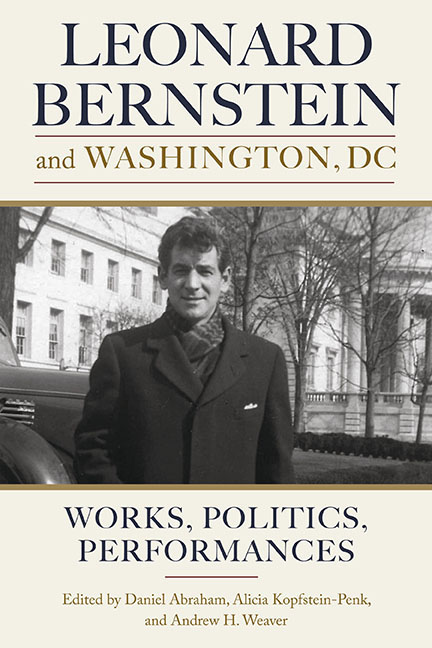1 - Bernstein and Washington, DC: Introductory Reflections
Published online by Cambridge University Press: 28 April 2020
Summary
At first glance, a consideration of the renowned composer and conductor Leonard Bernstein (1918–90) in relation to “place” evokes images of the northeastern United States. Bernstein spent his childhood in Jewish immigrant neighborhoods in interwar Boston, where his family moved from one rental apartment to another as his father built a successful beauty supply business. Then the setting shifted to Harvard College across the river in Cambridge, where Bernstein graduated in 1939 and returned repeatedly over the years as a renowned alumnus, most famously to deliver the Charles Eliot Norton Lectures in 1973. Then New York City came into focus, becoming Bernstein’s home for his entire adult life and the place with which he was most closely identified. There Bernstein conquered Broadway repeatedly, perhaps most decisively with West Side Story in 1957, and there he directed the New York Philharmonic from 1958 to 1969, becoming a celebrity conductor whose legacy remains crucial to the Philharmonic's identity. In New York City, largely as an extension of his work on the podium, Bernstein forged an electrifying relationship with the camera. This was true with still photography—Bernstein was naturally photogenic—and even more importantly with television. His series of Young People's Concerts, which were broadcast on CBS from New York City (1958–72), brought mass media into the concert hall, with the goal of educating children. Multiple generations of Americans remember those telecasts vividly as core experiences of childhood and adolescence. In a list of Bernstein's most beloved places, Israel figured prominently too, not because of extended residency but as a cultural and religious anchor. Bernstein made his first trip to Israel in 1947, soon after the end of World War II, and he maintained a longterm relationship with the Israel Philharmonic Orchestra, conducting it with great loyalty over the decades.
But Washington, DC? Bernstein never lived there, and he was the antithesis of a bureaucrat. Yet as one of the preeminent cultural figures of his generation, Bernstein found that the nation's capital offered a site to stage performances with exceptional visibility, often in support of his humanitarian convictions.
- Type
- Chapter
- Information
- Leonard Bernstein and Washington, DCWorks, Politics, Performances, pp. 9 - 16Publisher: Boydell & BrewerPrint publication year: 2020



